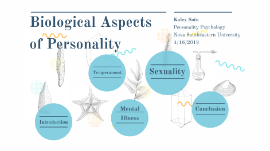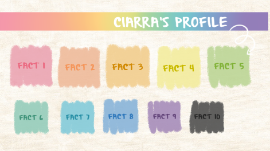Personality Psych Powerpoint
Transcript: Kaley Soto Personality Psychology Nova Southeastern University 4/16/2019 Biological Aspects of Personality Biological forces play an imperative role in the development and display of certain facets of one’s personality. Attributes such as temperament, mental illness, and sexuality are all affected by these biological aspects. Introduction Introduction Temperament Temperament Temperament can be described as “An individual’s characteristic emotional and motivational nature” (Friedman, et. al., 2016, p. 6). Personality psychologists have studied the ways in which biology has an influence over this, many citing the nervous system and neurotransmitters as having imperative significance. Neurotransmitters are “the chemicals nerves use to communicate”, dopamine and serotonin being just two of importance (Friedman, et. al., 2016, p. 108). If a deficiency, or overabundance, of these transmitters exists within an individual, direct influences on temperament can be viewed. Through individual variations within the nervous system and neurotransmitters, each person’s temperament is affected in different ways, producing unique effects on one’s personality. Neurotransmitters According to Eysenck, “extroverts have a relatively low level of brain arousal, and so they seek stimulation… introverts, on the other hand… have a higher level of central nervous system arousal, and so they tend to shy away from stimulating social environments” (Friedman, et. al., 2016, p. 106). “Sensation seekers”, who “seem to have a strong, nervous system–based, orienting response… [seemingly] biologically primed to seek out and engage their environments” (Friedman, et. al., 2016, p. 108). Examples Examples Mental Illness Mental Illness Of the many different mental disorders known to man, many come to fruition through biological tendencies, specifically Schizophrenia, Bipolar Disorder, and Depression. According to the Diagnostic and Statistical Manual of Mental Disorders (DSM-5), schizophrenia can be characterized by “delusions, hallucinations, disorganized speech and behavior, and other symptoms that cause social or occupational dysfunction” (American Psychiatric Association, 2013). Biologically, “many studies have confirmed that schizophrenia tends to run in families… [meaning] if one has a schizophrenic parent, the odds of schizophrenia rise dramatically” (Friedman, et. al., 2016, p. 114). Researchers also found that “if one has a schizophrenic identical twin, the odds approach 50–50 of developing” the ailment (Friedman, et. al., 2016, p. 114). Schizophrenia Schizophrenia Bipolar Disorder, also known as manic-depressive illness, is described as “swing[ing] regularly from wildly enthusiastic energy to hopelessly dark depression” (Friedman, et. al., 2016, p. 114). In a study conducted between identical twins, it was found that if one twin suffered from Bipolar Disorder, “then the identical twin [was] also very likely to suffer [from] this disorder” (Friedman, et. al., 2016, p. 115). Bipolar Disorder Bipolar Disorder Depression, according to the DSM-5, “ affects how you feel, think and behave causing persistent feelings of sadness and loss of interest in previously enjoyed activities… [and] can lead to a variety of emotional and physical problems” (American Psychiatric Association, 2013). Those with a variation in the, “mu opioid receptor gene (OPRM1)... were more sensitive to social rejection... and that this social pain could be seen in the region of the brain that generally processes physical pain”, demonstrating how biology and the environment can bring about mental illness, and ultimately, effect one’s personality (Friedman, et. al., 2016, p. 115). Depression Depression Sexuality Sexuality Much like studies done in regards to mental illness, analysis was conducted on family members of homosexuals, finding that “homosexuality tends to run in families, and mono-zygotic twins [were] more likely than dizygotic twins to have the same sexual preference” (Friedman, et. al., 2016, p. 116). According to researchers, “part of the brain’s anterior hypothalamus, known to be related to sexual behavior, significantly differs in gay men...and the hypothalamus reacts differently to sexual smells in gay versus straight men...and in lesbian versus straight women” (Friedman, et. al., 2016, p. 116). Conclusion Conclusion Temperament, mental illness, and sexuality are all influential aspects of one’s personality. Through extensive analysis of these components of one’s character, it is evident that biological forces play an imperative role in the ways and proclivity in which they uniquely present themselves, ultimately manipulating personality as a whole. References American Psychiatric Association. (2013). Diagnostic and Statistical Manual of Mental Disorders (5th ed.). Arlington, VA: Author. Friedman, H. S., & Schustack, M. W. (2016). Personality: Classic Theories and Modern Research. Boston: Pearson.

















